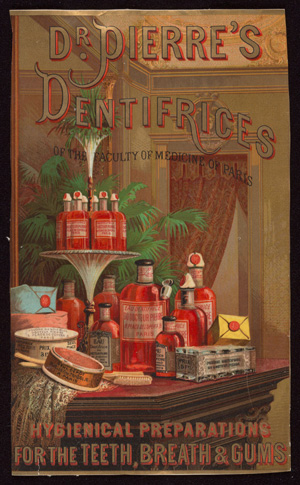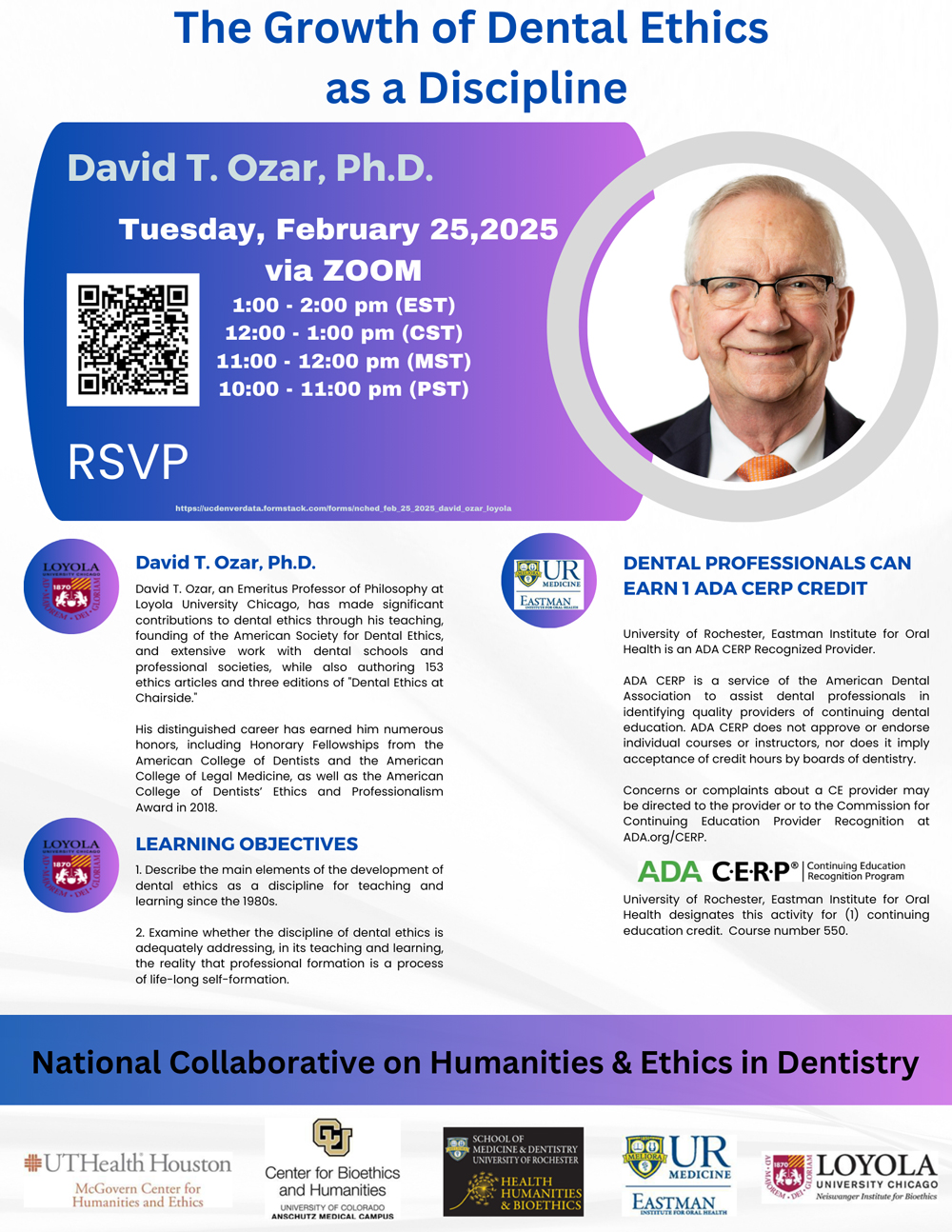The National Collaborative on Humanities and Ethics in Dentistry

The National Collaborative on Humanities and Ethics in Dentistry (NCHED) aims to create unique and valuable opportunities for reflection, learning and teaching on ethical issues in dentistry and to stimulate progress nationwide in using arts and humanities to improve dental practice, research, policy and education.
Examination of ethical issues in dentistry tends to revolve around a few commonly-taught scenarios, but an increasingly wide variety of issues are arising at the intersection of dentistry and ethics, business, public health, research and more. This collaborative program aims to fill these gaps by providing thought-provoking and expert-informed enduring content that will be of value as the profession of dentistry evolves to meet the increasingly complex needs of patients and society.
General Goals
- Focus on the potential for dental faculty and practitioners to drive positive change as science, business and health care adapt to meet the needs of the communities they serve.
- Identify and address emerging ethical issues in dental policy and practice, focusing on areas where arts and humanities interventions may benefit patients and practitioners.
- Learn from interdisciplinary connections between dentistry and other professions to generate insights into challenges and opportunities facing dentists today and in the future.
- Build a community of stakeholders interested in exploring solutions to deep-seated quandaries related to humanities and ethics in dentistry
- Explore connections between the past, present, and future, in recognition that present circumstances were created through historical policy and practice and understanding history can inform current and future strategies for improvement.
Partnering Institutions
In 2015, the UTHealth School of Dentistry (with support from the McGovern Center for Humanities and Ethics) launched a dental humanities program, which is the first of its kind in any United States dental school. Since the first class was admitted, about 30 students have graduated from the program. It is a three-year program with learning opportunities that allow students to reflect, share, and work together to enhance their individual and collective capacities to care for patients in humanistic ways.
The basic requirements of the program include:
- attendance at program meetings and at events related to humanities or ethics in the Houston community
- completion of interprofessional elective courses on topics such art, ethics, literature, and history
- reflective journaling
- service learning
- a final project
Upcoming Events

Past Events
The Ethical Imperative for Medical/Dental Integration
Nanette Elster, JD, MPH
Professor of Bioethics, Loyola University Chicago
Learning Objectives:
- Understand the history of medical/dental integration.
- Identify current challenges to medical/dental integration.
- Examine ethical underpinning of both medicine and dentistry for better coordination.
Spirituality, Religion, and Oral Health
Carlos S. Smith, DDS, MDiv, FACD
Learning Objectives:
- Recognize how spirituality and religion may inform oral healthcare delivery
- Recognize how spirituality and wellness impact health and oral health
- Describe how spiritual and religious communities may serve as key locus for combating misinformation and disinformation about oral healthcare, particularly for historically marginalized populations
What Does It Mean to Care?: A Readers' Theater Performance of Imelda for Medical-Dental Professionals
moderated by Margie Hodges Shaw, JD, PhD, MA, HEC-C. Panelist include Sean W. McLaren, DDS, MBA; Nancy Chin, PhD, and Erik Larsen, PhD. Richard Selzer’s short story raises moral questions at the heart of medicine and dentistry. Following the performance, the interdisciplinary panel will engage participants in a conversation about the moral questions in oral surgery and patient care. Brought to you by the National Collaborative on Humanities & Ethics in Dentistry.
The Dentist in Film: Beneath the Comedy and the Horror
presented by Howie Movshovitz, PhD, Film Critic at KUNC and Film and Television Lecturer at CU Denver. Dentists have historically been portrayed in film as either farcical or evil. How did this notion evolve, and what is the impact on public perception? This April 29, 2024 National Collaborative on Humanities and Ethics in Dentistry event was moderated by Catherine Flaitz DDS, MS with additional commentary from Christine Slobogin, PhD, Assistant Assistant Professor of Health Humanities and Bioethics at the University of Rochester.
Everything Comes Alive with Cherry Pie: Stories of Life at the End of Life
presented by Marcia Brennan, PhD, the Carolyn & Fred McManis Professor of Humanities and Professor of Religion and Art History at Rice University on February 13, 2024. Professor Brennan shared her work as a literary Artist In Residence working with advanced cancer patients at the MD Anderson Cancer Center and at the Hospital of the University of Pennsylvania. The talk included case studies that vividly engage themes relating to the mouth and to issues concerning taste, voice, speech, power, and the uniqueness of human identity.